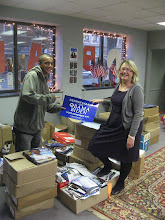Cape Town is a revelation, or as much as it can be after three days in my sick bed with a chest infection, caught no doubt on a plane. Not to mention the ferocious storms that battered the city for most of our short stay – the worst in seven years according to the media.
I really wasn’t sure what to expect of the Mother City, so called because it is where European got their first toe-hold in Africa; lots of white millionaire ex-pats I think, and there are certainly plenty of those.
On the drive to Cape Point we passed scores of very expensive, heavily secured homes, were passed several times by very impatient Porsche drivers and gaped in awe at the scores of (white) surfers who, on a wet Monday afternoon, clearly had little to do with their time but fling themselves at the mercy of the Atlantic sea.
But the city is much more than a playground for rich, white folks.
It is a lively cosmopolitan place, with high-rise Art Deco buildings that would look at home in New York, great restaurants and a stunning waterfront. Eating moules and frites while watching lumbering seals enjoy a Sunday afternoon snooze was definitely a highlight of our stay.
Others were the penguins at Boulders Bay; standing at Cape Point, which seemed for a moment like the end of the world and enjoying tapas at Fork – twice.
But this is also a city with a past, and a challenging future.
We tried three times to make the trip to Robben Island where Nelson Mandela was imprisoned for 27 years, but failed because of the bad weather.
There is a modest, but heart-breaking museum near the national parliament which tells the terrible story of the forced removal of the residents of District Six to shanty towns outside the city centre.
One of its exhibits is a park bench that bears the sign: Europeans Only. This ordinary piece of street furniture is a haunting reminder of the capacity of ordinary humans to do evil.
And there is mile after mile of poor suburbs, where the vast majority of Cape Town residents live in homes that are often nothing more than tin shacks.
It will be a long time before all South Africans will share in the wealth that is so conspicuous in this beautiful city, but that day will come. It has to.
“Overcoming poverty is not a gesture of charity. It is an act of justice. It is a protection of a fundamental right, the right to dignity and a decent life.”
Nelson Mandela.
Wednesday, September 3, 2008
Subscribe to:
Post Comments (Atom)





No comments:
Post a Comment